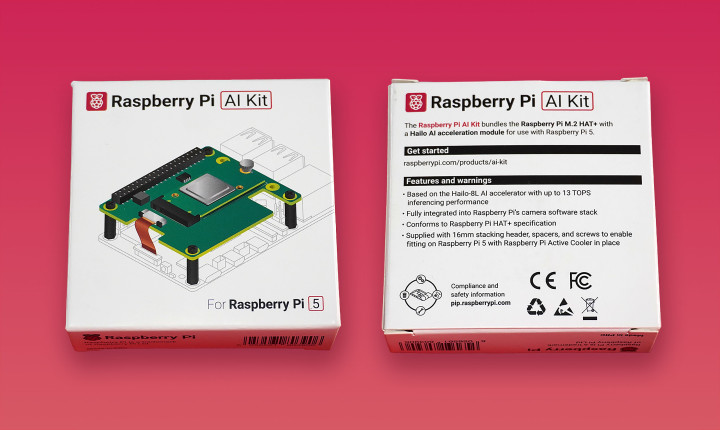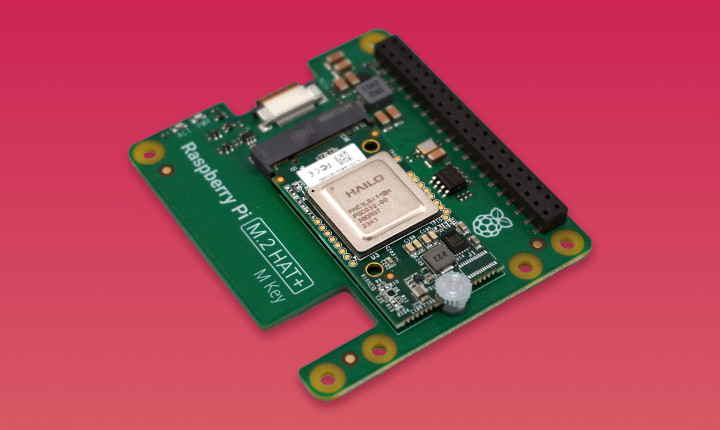Official Raspberry Pi AI Kit Integrates AI Accelerator With M.2 HAT+
on
Big news in the world of edge AI computing: Raspberry Pi has rolled out a kit consisting of its M.2 HAT+ bundled with the Hailo-8L AI accelerator. This new combo brings serious AI horsepower to the Raspberry Pi 5, giving developers and engineers some impressive inferencing performance to play with. Let's take a closer look at the Raspberry Pi AI Kit.

Why Live on the Edge?
Edge computing processes data locally on devices rather than relying on cloud-based servers. This approach significantly reduces latency, ensuring faster response times and improving reliability. It’s crucial for applications requiring real-time decision-making, such as robotics, autonomous vehicles, and smart home devices. By managing data at the edge, one can enhance performance and reduce bandwidth expenses, latency, and enhance data security.
The catch is that being right on the edge typically involves hardware with nowhere near the power of those server farms up in the cloud. The Raspberry Pi AI kit aims to take on that problem, with the integration of the Hailo-8L with Raspberry Pi's M.2 HAT+ exemplifying this shift toward more efficient and responsive AI-driven solutions.

In a recent chat with Eben Upton, co-founder of Raspberry Pi, he highlighted the growing importance of edge computing: “As more devices become intelligent, the demand for local AI processing increases. Our goal with this new AI kit is to make high-performance computing more accessible to developers working on the edge.”

The Hailo-8L Chip
So, what’s the big deal with the Hailo-8L? For starters, this AI accelerator is a beast, making it perfect for real-time AI tasks, which means you can tackle projects in robotics, computer vision, smart home devices, and industrial automation without it breaking a sweat. The M.2 HAT+ makes it super easy to tap into this power, leveraging the computational muscle of the Raspberry Pi 5.

The Hailo-8L AI accelerator is designed to deliver data center-class performance to edge devices, boasting up to 13 TOPS (Tera-Operations Per Second). This makes it an ideal fit for entry-level products that require AI capacity in the local area. What sets the Hailo-8L apart is its superior area and power efficiency, making it highly competitive compared to other solutions in its category.
It features low-latency, high-efficiency processing capable of managing complex pipelines with multiple real-time streams and concurrent processing of various models and AI tasks. This accelerator is also compatible with the Hailo-8’s comprehensive software suite, ensuring seamless upgrades to higher AI capacities in the future.
The Hailo-8L AI accelerator includes a comprehensive software suite with Hailo device drivers, HailoRT, and HailoTappas, which can be easily installed via the apt package manager. This ensures seamless setup and operation.
AI acceleration support is fully integrated with Raspberry Pi’s camera software stack, including support for libcamera, rpicam-apps, and picamera2. This allows for advanced image processing and AI applications directly on the Raspberry Pi 5.

Raspberry Pi AI Kit Key Features and Benefits:
- High Efficiency: The Hailo-8L is all about high-performance AI processing with minimal power draw. This is crucial for edge devices, where you need to balance performance and energy efficiency.
- Real-Time AI Processing: With its 13 TOPS, the Hailo-8L handles complex tasks like object detection, image classification, and speech recognition in real-time. Your applications can be more responsive and smarter.
- Seamless Integration: The kit comes pre-assembled with the Hailo-8L. Just plug it into your Raspberry Pi 5, and you're ready to go. No fuss, no hassle.
- Robust Software Support: Fully integrated into the Raspberry Pi OS environment, you can easily install Hailo’s software packages via the apt package manager. This includes device drivers and neural network libraries, so you can hit the ground running with your AI projects.
This setup pairs the affordability and versatility of Raspberry Pi with the advanced AI chops of the Hailo-8L. The result? You can run sophisticated AI models right at the edge, cutting down on latency and bandwidth compared to cloud-based solutions.
The Hailo-8L supports popular AI frameworks such as TensorFlow, TensorFlow Lite, Keras, PyTorch, and ONNX, and is compatible with ARM host architectures. This makes it ideal for deploying sophisticated AI models on the Raspberry Pi 5, and opens up a whole new area of possibilities for what we can achieve with our Raspberry Pi setups.
Upton explained the decision to collaborate with Hailo: “What we found exciting about Hailo was its high performance and efficiency. The Hailo-8L brings 13 TOPS to the table, significantly more than previous solutions. This, combined with its excellent tooling for model conversion, made it a natural fit for our edge AI ambitions.”
Development and Challenges
Asked if he foresaw the M.2 HAT being used for AI accelerators besides NVMe SSDs, he said, “When we launched the Raspberry Pi 5, we initially thought most uses for the M.2 HAT would be for storage. However, we quickly realized there was significant interest in AI accelerators, network cards, and graphics solutions.”
As for the inevitable obstacles that are encountered in putting together a sophisticated pairing such as this, he recalled, “One challenge we faced nearing launch was optimizing the thermals. Initially, we didn't have a thermal pad between the accelerator and the baseboard, but we included it in the final version to improve heat dissipation.” Despite these hurdles, the collaboration between Raspberry Pi and Hailo proved fruitful, leveraging each company’s strengths to deliver a robust and efficient product.
Upton also mentioned the difficulty of applying AI acceleration due to the rapidly changing architectures of models: “One of the challenges I think we have with GenAI at the moment is that it’s actually very hard to apply acceleration. Things need to settle down before you can design an accelerator that is meaningfully more capable than a CPU or GPU without sacrificing flexibility.”
Use Cases and Ideal Applications
Upton shared his excitement about the future of AI on the Raspberry Pi platform: “We’re going to see some amazing applications in industrial robotics and smart home devices. The potential is enormous, and this AI kit will help unlock that for our users,” Upton said. He also highlighted the popularity of cameras as accessories for the Raspberry Pi: “Cameras are an incredibly popular accessory for Raspberry Pi, and being able to apply more intelligence to those camera applications is a big deal. This AI accelerator is perfect for tasks like object detection and image classification.”

The Hailo-8L is optimized for vision-related tasks, making it ideal for applications like surveillance, automated quality inspection in manufacturing, and healthcare imaging. “One of the challenges with GenAI at the moment is the rapidly changing architectures of models. However, the Hailo-8L is designed to handle more stable, vision-related tasks efficiently.”
The Raspberry Pi and Hailo Partnership

Raspberry Pi is all about making high-performance computing accessible and affordable. Hailo, on the other hand, specializes in AI processors that bring data center-class performance to edge devices. This partnership highlights what’s possible when you combine cutting-edge hardware innovation with AI acceleration.
Upton also reflected on the educational impact of their products: “Our aim has always been to put programmable hardware in kids’ hands and see what happens. It’s about nurturing curiosity and enabling the next generation of engineers and developers.”
For those of us always looking to push the boundaries with AI at the edge, the new Raspberry Pi AI Kit is a game-changer. It opens up a whole new realm of possibilities for what we can achieve with our Raspberry Pi setups.




Discussion (0 comments)